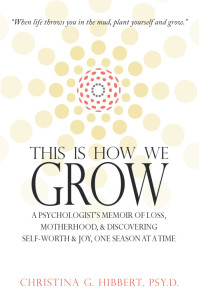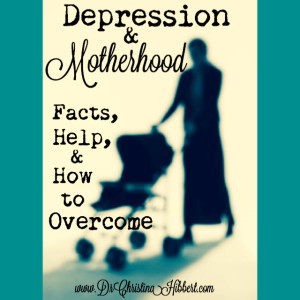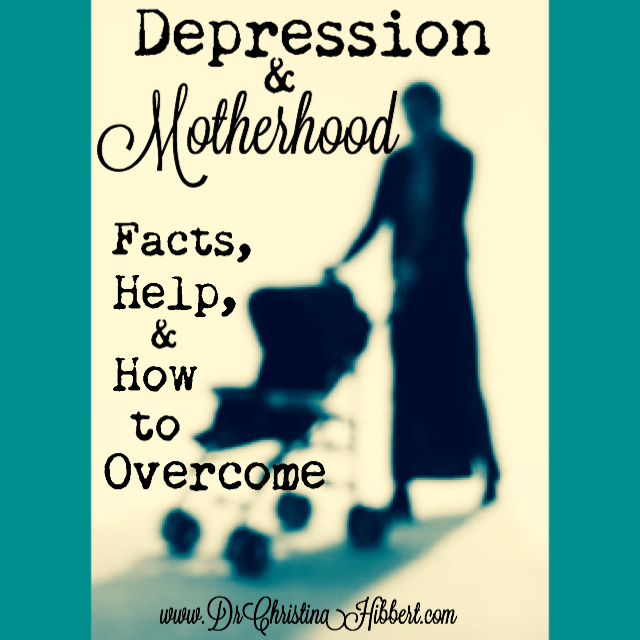
05 Aug Depression & Motherhood: Facts, Help, & How to Overcome
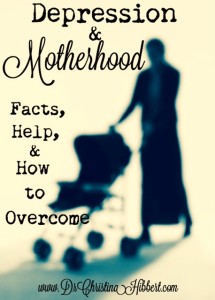 Depression affects one in five women throughout their lifetime and is especially prevalent during the childbearing years. Pregnancy, postpartum, hormone shifts, sleep depravation, and the pressure of parenting and raising children while also dealing with life changes and stress, all combine to make depression in motherhood common.
Depression affects one in five women throughout their lifetime and is especially prevalent during the childbearing years. Pregnancy, postpartum, hormone shifts, sleep depravation, and the pressure of parenting and raising children while also dealing with life changes and stress, all combine to make depression in motherhood common.
Motherhood & Depression
In fact, motherhood does make us more vulnerable to depression. While the lifetime rate for women and depression is about 20%, the majority of these episodes occur in the childbearing years. 10% of women experience depression in pregnancy, 15% experience postpartum depression, and if untreated, maternal depression can last for months or even years. It makes sense, doesn’t it, considering the extreme stress, lack of sleep, hormonal shifts, and life changes that occur in the mothering years?
There are various types of depression in motherhood, including major depression, which is a clinical disorder and includes symptoms like:
- sadness, crying
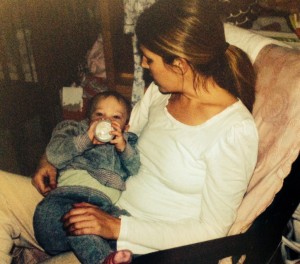
Singing & rocking my youngest, Sydney. Though I was able to breastfeed her, I introduced a bottle early on. I knew I needed it to help me survive PPD.
- fatigue
- hopelessness
- feeling worthless
- changes in sleep or appetite
- lack of interest in things you used to enjoy
- guilt, frustration, and/or anxiety
- feeling overwhelmed
- possible suicidal thoughts
Dysthymia is a form of milder depression that persists most of every day for most days, for two years or more. Seasonal depression, or Seasonal Affective Disorder, is also common in women of childbearing years, and is believed to be more common in women who are also vulnerable to PMS. Finally, situational depression may occur because of loss, change, or life stress. This type of depression may go away when the situation clears up, or it may persist, especially if it was never dealt with.
Hormones, Depression, & Motherhood
And then there are hormones. Hormone-related depression can come in the form of postpartum depression, perimenopause, and/or PMS (premenstrual syndrome). It’s estimated 85% of women experience at least one significant symptom of PMS each month, and PMS is most common and at its worst among women in their childbearing years.
Approximately 3-8% of women experience Premenstrual Dysphoric Disorder, or PMDD. PMDD most commonly affects women who have at least one child, are in their late 20’s-early 40’s, and who have a family or personal history of depression or postpartum depression. [1] These facts just speak to the role our shifting hormones and compiling life experiences play in the development of mood changes, and especially in depression. (More on hormones and women’s emotions here.)
How do we know when we’re experiencing depression, versus just having a bad day or week or month or year?
People often say, “I’m depressed,” but what they really mean is that they’re sad, stressed, overwhelmed, exhausted. True depression lasts for two weeks or more, and includes symptoms like those above, like: sad, anxious, or “empty” feelings; feelings of hopelessness, worthlessness, or guilt. It also significantly impacts your daily life, your relationships, and your functioning. Major depression isn’t something you just wake up and “get over.” It’s something you must work to overcome. But, remember that, with help and time and work, it IS something that can be overcome.
The Impact of Depression on Kids, Partners, Family
The hardest part of depression in motherhood is often the fact that we moms can’t afford to be 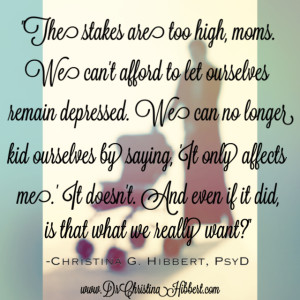 depressed. We have to be “on,” 24/7; we don’t want to feel depressed, and we especially don’t want our children to suffer as a result. All this can add up to some pretty hefty guilt, and sometimes, even shame.
depressed. We have to be “on,” 24/7; we don’t want to feel depressed, and we especially don’t want our children to suffer as a result. All this can add up to some pretty hefty guilt, and sometimes, even shame.
The truth is that untreated maternal depression does impact our children. In fact:
- Untreated maternal depression is the number one predictor of future behavioral and cognitive problems in the child.
- It is associated with less positive parenting practices, like smiling, reading to, and talking with children.
- It can affect social development, since children of depressed mothers often take on the low self-esteem their mothers tend to exhibit.
- And untreated depression can negatively impact marriage and relationships as well, often leading to depression in one’s husband or partner, or too often, to separation or divorce.
Yes, the stakes are too high, moms. We can’t afford to let ourselves remain depressed. We can no longer kid ourselves by saying, “It only affects me.” It doesn’t. And even if it did, is that what we really want? To feel miserable? To feel unworthy? To feel so low all the time?
I don’t say this to add more guilt. Trust me, as a mother who struggles with depression myself, that’s the last thing I would want to do. I say this because it’s true. Motherhood does not mean depression. We can, and will, overcome depression, if we take it seriously and seek help. We can be happy, full of hope, and joyful as we raise our children. But first, we need to be honest with ourselves and seek help. We need to take action, to let go of the guilt that holds us captive. We must trust that we can, and will, be well again.
Help: What can we do about Maternal Depression?
There are many ways we can treat depression, including self-help, social support, and professional help like therapy and medication. In order to know what will work best for you, it’s important to create a game plan.
In this week’s episode of my “Motherhood” radio show, I spoke with Jennifer Peterson, mom of 5, writer, and creator of the blog “The JoyFinders.” Jen has struggled with depression and is very candid about the lessons she has learned, and I share some of my own struggles and lessons as well. Listen to the episode on demand, on WebTalkRadio.net or download it for later. Or, watch it on my YouTube channel. Then, read how to create your game plan, below.
[stream provider=youtube flv=http%3A//www.youtube.com/watch%3Fv%3DaSQrCikl660 img=x:/img.youtube.com/vi/aSQrCikl660/0.jpg embed=false share=false width=640 height=360 dock=true controlbar=over bandwidth=high autostart=false responsive=16:9 /]
How to Overcome: Creating Your Game Plan
One thing Jen shared was how important it is for her to have a game plan, and I agree, it’s crucial. How do we create a “game plan” for dealing with depression? Here are a few ideas:
- Be honest about where you are. Before you can be honest with others, you need to be
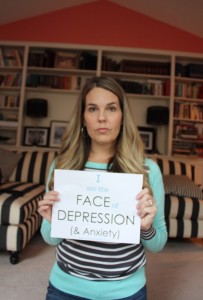
I started the “I am the FACE of Depression” campaign to get people talking. It’s okay to admit you struggle with depression. It doesn’t define you.
honest with yourself. It’s okay to say “I’m struggling with depression.” In fact, you may find it freeing. Sort of like an exhale—it can be a relief to just be where you are. Sometimes, your body is screaming at you: “Hey! I’m not doing so well. We need to be depressed for a while and figure some things out!” Are you listening? (Read “Women & Depression” for a new view.)
- Find what you need. What do you need to overcome depression? This will look a little bit different for each person, but pay attention and see what things help you feel better. Your list may include things like, “I need to talk with a friend each day, to go for a walk, and to get to bed early.” It may include, “I need to give myself a break, to say “no” more for now, and to go out with my husband at least once a week.” What do YOU need when you’re in the throes of depression? Some common items include: sleep, exercise, activity, social interaction, doing less, alone time, time to rest, serving others, quality time with kids/partner/friends, a support group, therapy, massage, medication, etc.
- Seek support. We need each other, especially in times of discouragement, grief, heartache, and depression. Yet, depression can make us want to isolate. That’s one of the hardest things about it. But healing comes through seeking and finding support. Search out those people in your life who make you feel comfortable, who “get” you, who understand depression and will be there for you. Sometimes, it helps to have a friend or family member who will check up on you, who will push you out of the house or stop by to make sure you’re taking care of yourself. Professional help is important, too. Therapy is a great place to start—to learn coping strategies and help solidify your game plan. If your depression is moderate to severe or if self-help and therapy don’t work, you may want to talk to your doctor about trying an antidepressant. (Read “Antidepressant? Or not? )
- Schedule activity. Even one little activity each day that gets you dressed or interacting with people or out in the sunshine or out of the house can make a big difference on your mood. It’s one of the best things you can do to “treat” your depression. And getting in the sunshine is also excellent for lifting depressed mood.
- Talk about it. Depression isn’t something to be ashamed of. The more we talk about it, the more we see we are not alone. I wrote about my battles with depression in this article. Jen shares her struggles in our Motherhood interview. Be honest with your family, with your partner, with your close friends. No, you don’t have to tell everyone you meet. But, explaining to those who love you most that you’re having a hard time and are working on it is very helpful. I encourage you to talk with your kids about it, too, in words they can understand. Many moms fear that telling their kids will make them afraid or worried. The truth is, they probably already know something isn’t “right,” and talking honestly with them about it can be reassuring, if it’s done right. Same goes for husbands/partners. My close friend struggled to even tell her husband she was suffering from depression and anxiety. She tried to handle it all on her own, and she eventually took her own life. Again, the stakes are too high. We can’t afford to remain silent. Talk about it. It is healing.
- Write it down. Once you know your game plan, write it down. Post it somewhere you will see it often so it can remind you of what you’re aiming to do.
- Follow your plan and adjust as needed. It will take time to figure out what you need to become depression-free, just like it will take time to heal from depression. It’s okay to let yourself be where you are, to take the time you need to do it right. Make changes as you learn new elements of your plan for wellness. For instance, if winter hits and you suddenly realize how much sunshine has to do with your mood, you may make sitting in the sun each morning a part of your routine, or exercising outside a “must do.”
Remember:
- Depression isn’t you.
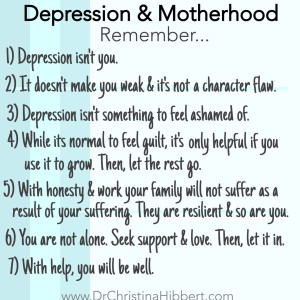
- It’s doesn’t make you weak, and it’s not a character flaw.
- Depression isn’t something to feel ashamed of; it’s something to work on.
- While it’s normal to feel guilt when you’re a mom who’s depressed, it’s also only helpful if you use that guilt to help you grow. Let it guide you toward the help and plan you need. Then, let the rest go.
- With honesty, openness, and work, your family will not suffer as a result of your suffering. They are resilient, and so are you.
- You are not alone. Seek support and love. Then, let it in.
- With help, you will be well.
What is the hardest part of depression in motherhood for you? What helps you overcome? What does your game plan contain? Share your thoughts by leaving a comment, below.
References:
[1] Premenstrual Syndrome Fact Sheet, http://www.womenshealth.gov/publications/our-publications/fact-sheet/premenstrual-syndrome.html.
[2] More facts on Postpartum Depression: http://www.postpartum.net
Join one of my new webinar series!
“Women’s Emotions Across the Lifespan: Hormones, The Brain, & Emotional Health”
“Growing Through Postpartum Depression & Anxiety”
Starting in September!
Details here: http://www.drchristinahibbert.com/products/webinars/
Be sure to check out my New show, “Motherhood,” on WebTalkRadio.net!
Link for this episode: Depression & Motherhood: What is it? And what can we do about it?
You may manage your subscription options from your profile.
Be sure to check out my bestselling, award-winning memoir, This is How We Grow!
Available now at Amazon or Barnes & Noble!
My latest book, “Who Am I Without You,” is available now at
Target, Amazon, Barnes & Noble, New Harbinger, or your local bookseller!
Let’s Connect!
SUBSCRIBE, above, “Like” me on Facebook Dr. Christina Hibbert; This Is How We Grow, & follow me on Twitter, Pinterest, & Instagram!
Related Posts/Articles:



